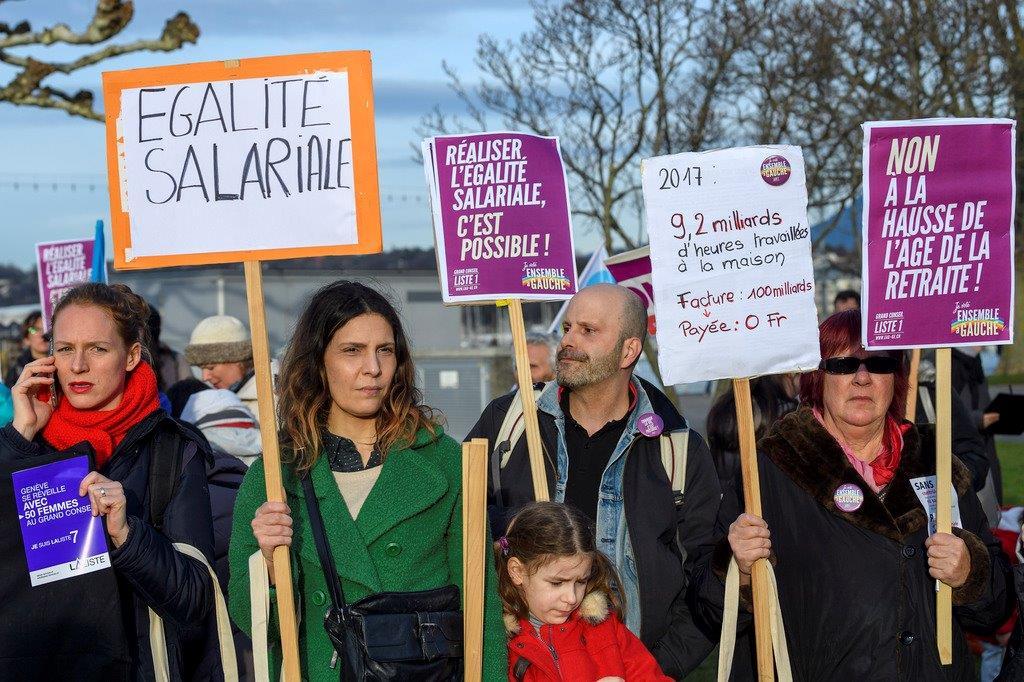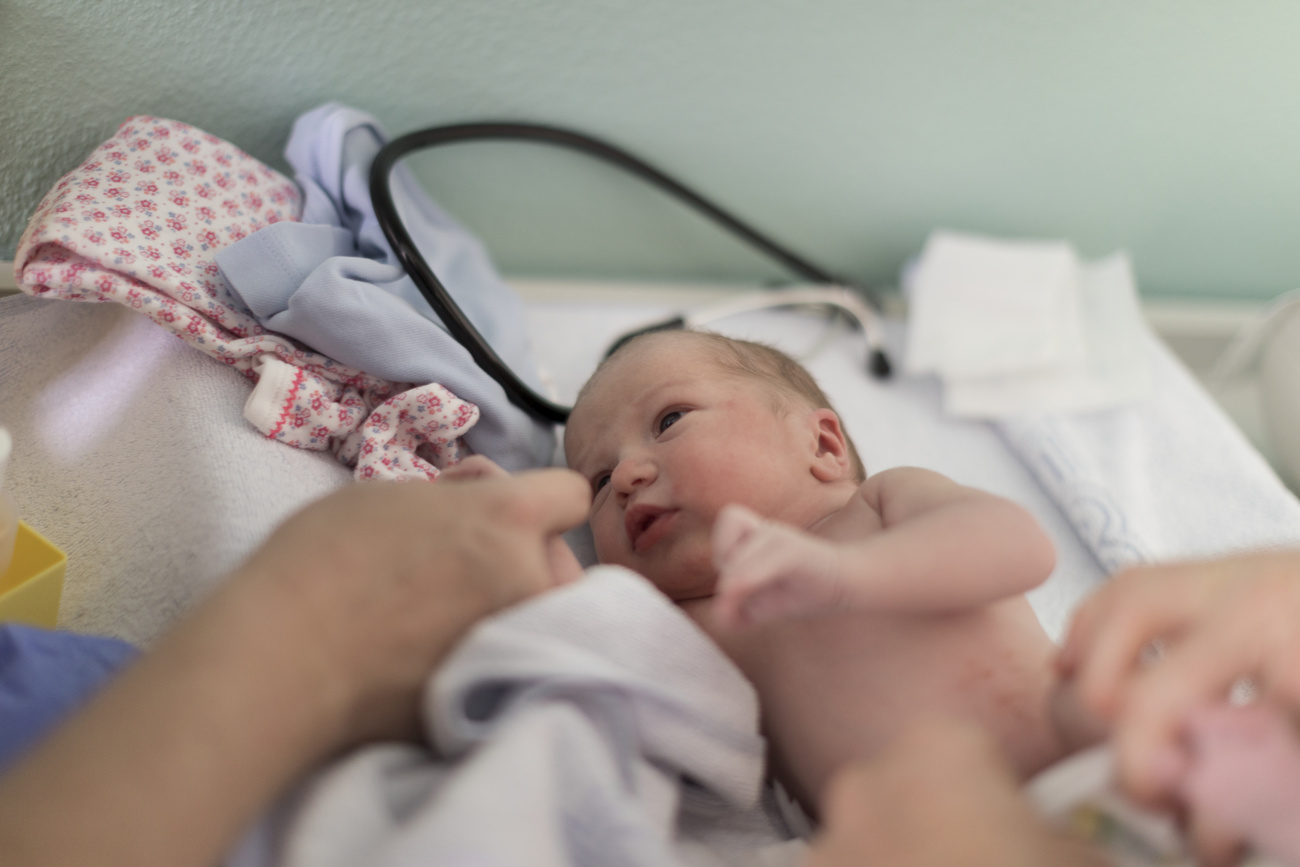Mum in the kitchen, dad in the shed: why roles are slow to change in Switzerland

Men are increasingly involved in household chores in Switzerland, more so than in other countries. But this does not prevent inequalities from growing within a couple after a child is born. A demographer and graphs shed light on the issue.
Two hours 45 minutes a day, or 19 hours a week: this is the average amount of time that men – across all household types – devote to domestic and family tasks in Switzerland, according to the Federal Statistical OfficeExternal link.
This is nearly three hours more a week than 20 years ago. After Norway and Sweden, Switzerland is now one of the developed countries where men pull their weight the most at home. In the developed countries of the OECD the average is two hours a day.
Yet men still do not do nearly as much as women, who devote an average of four hours a day (nearly 29 hours a week) to meals, housework and laundry. This is only slightly less than the 30 or so hours a week in the early 2000s.
And if we take households with children, the workload rises to almost six-and-a-half hours a day for mothers, compared with just under four hours for fathers (45 and 27 hours a week respectively).
“The division of labour is still unbalanced in Switzerland,” says Jean-Marie Le Goff, a demographer and senior lecturer and researcher at the University of Lausanne. “There are, of course, exceptions, but overall women do much more than men, not just with regard to housework but also caring tasks.”
Le Goff adds that “not everything can be quantified in hours spent. The ‘mental load’ – that is, the logistical aspects of managing a household, preparing menus and shopping lists, organising activities and scheduling medical appointments, for example – is largely borne by women. This is very difficult to capture in surveys”.
Jean-Marie Le GoffExternal link holds a doctorate in demography and is a senior lecturer and researcher at the University of Lausanne. His main areas of research include family life paths and the transition to parenthood. He has focused specifically on how dynamics within couples change when they become first-time parents, and how men’s and women’s life paths differ as a result of this transition. He is the co-author of the book Becoming Parents, Becoming UnequalExternal link.
Roles become polarised once a child is born
So who does what at home? Put simply, women do more of the cooking and cleaning, while men tend to pay the bills and do DIY jobs. “These are generally tasks that require less input in terms of time and energy and that come up less frequently”, Le Goff says.
Since 2000, this distribution of tasks has remained virtually unchanged, although men are slightly more involved in preparing meals (+2 hours a week) and doing housework (+1 hour) than 20 years ago, while women spend slightly less time doing the ironing or the shopping (-40 minutes a week).
Women are also the primary caregivers of the children: 23 hours a week for mothers, compared with 14 for fathers. Fathers are significantly more hands-on than in 2000 (3.5 hours more per week), but this has not reduced the gap with mothers, as the total time devoted to children has increased over the past two decades.
This, Le Goff says, is the result of the “new educational exhortations to invest more in children’s activities and personal development”, which can also be seen in other developed countries.
In households with children, the domestic workload – in itself heavier – is more unevenly distributed. The birth of the first baby is very often the turning point, explains Le Goff, who is the co-author of a study carried out among couples before and after becoming parents. “Before children arrive on the scene, the chores are more or less shared, but after that they become unbalanced and truly polarised.”
He cites the seemingly mundane example of laundry, a task many men shy away from after the birth of a child. “This may simply be because the volume of washing increases,” Le Goff suggests, but another possible explanation is that laundry tasks “change in nature when a baby is born, and become care tasks”, perceived more as women’s work.
Unpaid work mainly done by women
The phenomenon is not intentional, Le Goff stresses, and not necessarily the result of a conscious decision. “Parents often think that after their child is born they will be able to continue sharing the chores as they did before, but things don’t work out that way at all.”

Another studyExternal link on the family and shifting gender roles, carried out in 2022 by the Swiss Centre of Expertise in the Social Sciences (FORS) – which shared the results with SWI swissinfo.ch – confirms that the vast majority of the population is committed to the values of equal roles: thus, around nine out of ten people think that both women and men should shoulder equal responsibilities in the home and that they should invest as much time and energy in their children’s leisure activities, while three-quarters of those questioned believe that fathers are just as capable as mothers of looking after their children.
However, “the image of the father as the breadwinner and the mother playing her main role in the private sphere is deeply engrained”, Le Goff notes. “Society tends to consider that the primary role of women is to be mothers and that their salary is an extra.”
The FORS study corroborated this view when the questions concerned mothers’ work. While 53% of respondents believed that women and men should provide equally for the family’s financial needs, the remaining 47% considered this to be more the responsibility of the father. Also, the overwhelming majority of respondents believed that the ideal way of organising the family was for mothers to reduce their working hours.
This is not the case everywhere. Thus, in neighbouring France, “the opposite question is asked, namely how to enable women to keep working full-time after they become mothers”, says Le Goff.
In practice, the vast majority of women in Switzerland cut back their working hours when their first child is born. More than three-quarters of Swiss mothersExternal link work part-time, compared with around 30% of women without children – and 13% of fathers. Switzerland has the second-highest proportion of female part-time workers in the OECDExternal link, after the Netherlands.
According to Le Goff, this distribution of employment within couples is “encouraged by the fact that, on the Swiss labour market, working hours can be more easily reduced in the jobs mainly held by women than in ‘male’ jobs”.

More
More working hours for women? Easier said than done
As well as having an impact on women’s economic and professional prospects, widespread part-time working by women leads to a widening gap in the distribution of tasks in the home: women employed at less than 50% thus do an average of over 50 hours of household chores per week.
Does greater equality mean more children?
To find the most equitable division of domestic and family tasks, one must look to Northern Europe – even if no country has achieved perfect equality. In addition to their deep-rooted commitment to gender equality, the Scandinavian countries are often cited as models for their long parental leave, which can be shared flexibly between both parents.
“When taken by men in the first few months after the birth of a child, especially the first child, parental leave seems to have an impact on the fathers’ subsequent involvement in various household tasks,” Le Goff says.
And in the context of a general decline in fertility, another question arises: can gender equality and the increased involvement of fathers help boost birth rates? Until a few years ago, this idea held some credenceExternal link, fuelled by the example of the Nordic countries, which still had some of the highest fertility rates in Europe. But the rapid decline in births seen there today, as elsewhere, casts some doubt on this hypothesis.

More
Fertility rates plummet in Switzerland – and beyond
Le Goff doubts that the workload associated with having a first child deters many parents in Switzerland from having a second one. “If you have one child, you will most likely have another, because the two-child norm is still very strong,” he says.
A situation of persistent inequality is not encouraging, however, and may well affect people’s decision to have children or not, or even to form couples and move in together.
Switzerland, Le Goff notes, has one of the highest proportions of women who remain childfree in Europe, particularly among the most highly qualified women. More than 30% of women with a tertiary degreeExternal link are concerned, often because they did not find the right moment in their lives to reconcile their career and family life.
Edited by Samuel Jaberg. Adapted from French by Julia Bassam/ts

More
Newsletters

In compliance with the JTI standards
More: SWI swissinfo.ch certified by the Journalism Trust Initiative










You can find an overview of ongoing debates with our journalists here . Please join us!
If you want to start a conversation about a topic raised in this article or want to report factual errors, email us at english@swissinfo.ch.